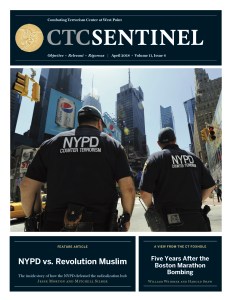From the Editor
Between 2006 and 2012, two men working on opposite sides of the struggle between global jihadis and the United States faced off in New York City. Jesse Morton was the founder of Revolution Muslim, a group that proselytized—online and on New York City streets—on behalf of al-Qa`ida. Mitchell Silber led efforts to track the terrorist threat facing the city as the director of intelligence analysis for the NYPD. After serving a prison sentence for terrorist activity, Morton now works to counter violent extremism. In our feature article, they tell the inside story of the rise of Revolution Muslim and how the NYPD, by using undercover officers and other methods, put the most dangerous homegrown jihadi support group to emerge on U.S. soil since 9/11 out of business. As the Islamic State morphs into a ‘virtual caliphate,’ their case study provides lessons for current and future counterterrorism investigations.
Five years ago this month, terror came to Boston, and Boston stood strong. Nicholas Tallant interviews William Weinreb and Harold Shaw on the lessons learned. Weinreb stepped down as Acting United States Attorney for the District of Massachusetts in January 2018. He was the lead prosecutor of the 2015 investigation and trial of Boston Marathon bomber Dzhokhar Tsarnaev. Shaw has served as the Special Agent in Charge of the Federal Bureau of Investigation’s Boston Division since 2015.
Between July and October 2017, a team of researchers conducted field interviews with young Sunni Arab men coming out from under Islamic State rule in the Mosul area. The resulting study by Scott Atran, Hoshang Waziri, Ángel Gómez, Hammad Sheikh, Lucía López-Rodríguez, Charles Rogan, and Richard Davis found that “the Islamic State may have lost its ‘caliphate,’ but not necessarily the allegiance of supporters of both a Sunni Arab homeland and governance by sharia law.” Amira Jadoon, Nakissa Jahanbani, and Charmaine Willis examine the evolving rivalry between the Islamic State and other jihadi groups in the Afghanistan-Pakistan region. Nafees Hamid profiles Junaid Hussain, a hacker from the United Kingdom, who until his death in August 2015 was the Islamic State’s most prolific English-language social media propagandist and terror ‘cybercoach.’
Paul Cruickshank, Editor in Chief
 Skip to content
Skip to content

